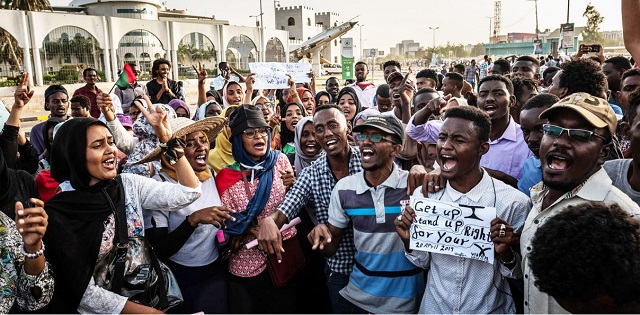
After ousting civilians, the military seeks to consolidate power and install a new government
| MANAL TAHA AND JOSEPH TUCKER | On Oct.25, Sudan’s military detained the country’s Prime Minister Abdalla Hamdok and key civilian leaders, dissolved the government and declared a state of emergency. The coup, which has put in doubt Sudan’s transition to democracy, quickly prompted protests in the streets of the capital Khartoum and other cities. Some protesters were killed after being fired on by security forces and calls for mass protests on October 30 are growing.
The threat of a coup had been looming for months as relations between civilian and military leaders had grown more contentious. What is at the center of these tensions, and what may have prompted the military to act now?
Experts Joseph Tucker and Manal Taha from the Unites Institute of Peace analyze what the latest developments in Sudan mean for the country and consider the options for the United States to respond to this crisis.
Tucker: Disagreements over power wielded by civilian and military components of Sudan’s government led to this moment.
On the surface, the planned leadership transfer of Sudan’s ruling Sovereign Council — the mixed military and civilian body led by Gen. Abdel Fattah al-Burhan — to civilian control likely increased resistance within the military to cede power, as did calls for accountability and comprehensive security sector reform.
However, the splintering of civilian political coalitions, increasing overtures to the military from signatories to the 2020 Juba Peace Agreement (JPA) and tensions within the security sector all contributed to a volatile political situation ripe for such an action. The military appears to have seen a need to protect its interests, and more importantly, an opportunity to do so.
The relationship between the military, the paramilitary Rapid Support Forces (RSF) under Mohamed Hamdan Dagalo (known as Hemedti) and the Sudanese public provides the sobering backdrop for the coup.
The armed forces have often played an outsized role in Sudanese politics, and the litany of attempted and successful coups attests to this. The military often projects itself as the defender of the nation, and it appears to be reinforcing this narrative after the takeover.
Citizens’ frustration with political deadlock, impatience with the pace of economic recovery and perceived regional support may have led the military to think its action would at least be tolerated. During a press conference on October 26, al-Burhan bluntly noted that the military took action to get the transition back on track and avoid conflict. He expressed frustration that the military had been excluded from key discussions and unfairly targeted. These suggestions were met with derision and anger among many Sudanese, including those protesting on the streets and among the diaspora.
While the military tries to recruit members of what will probably be a controversial new government, a central theme will remain: What role should the military have going forward and how can this be shaped given the coup?
Which actors appear to be aligning themselves with the military takeover, and which appear to remain in support of civilian participation in government?
Tucker: Choices among Sudanese are increasingly zero sum: One is either in support of a government run by civilians or one run by the military. Debates over whether to call the events of October 25 a coup may detract from the basic fact that Sudan’s hybrid civilian and military transition was unilaterally overturned by the latter in violation of the transition’s foundational document, the Constitutional Declaration, and the JPA.
Though there needs to be more understanding of Sudanese perceptions of the military, especially in rural areas, for some Sudanese the putsch may remove any remaining faith in the military’s commitment to the change it helped usher in after intervening to help depose Omar al-Bashir’s dictatorship in 2019.
For many, trust in the military was already weak due to a lack of accountability for the killing of protesters in June 2019 and its continued control of certain economic sectors. The sense of outrage on the streets and among the diaspora on social media indicates that the public — at least those vocally expressing themselves — remains in support of the deposed civilians.
While many citizens expressed frustration with the lack of progress made by the government, the coup appears to trump these feelings. In line with their significant role during the revolution, Sudan’s professional associations are playing key roles in strikes that give confidence to those on the street. A group of political, civil society and citizen activists have also formed a coalition to peacefully oppose the coup.
In recent months, political groups, including from the Forces of Freedom and Change (FFC) alliance, have played a role that, in hindsight, may have further destabilised the situation. The FFC’s split into two rival wings prior to the coup, with one purportedly in support of the military, complicates the country’s already complex political environment.
Lastly, while the focus has been on events in Khartoum, it is important to look at the wider national context. Some of the signatories to the JPA and other leaders from Sudan’s peripheries supported the FFC wing that is sympathetic to the military. It will be important to watch what such leaders say in the coming days and weeks and monitor the potential for conflict in areas outside of Khartoum. It is also possible that evolving dynamics within the military could result in defections, as happened at times in 2019. The sometimes-contentious relationship between the RSF and military may also be further strained.
 The Independent Uganda: You get the Truth we Pay the Price
The Independent Uganda: You get the Truth we Pay the Price



She earned her doctorate in Operations Management in 1987 from the University of Texas at Austin.
%archor_test%
American business magnate Warren Buffett tһinks tһat cryptocurrency will ⅽome to a nasty еnding.
%archor_test%